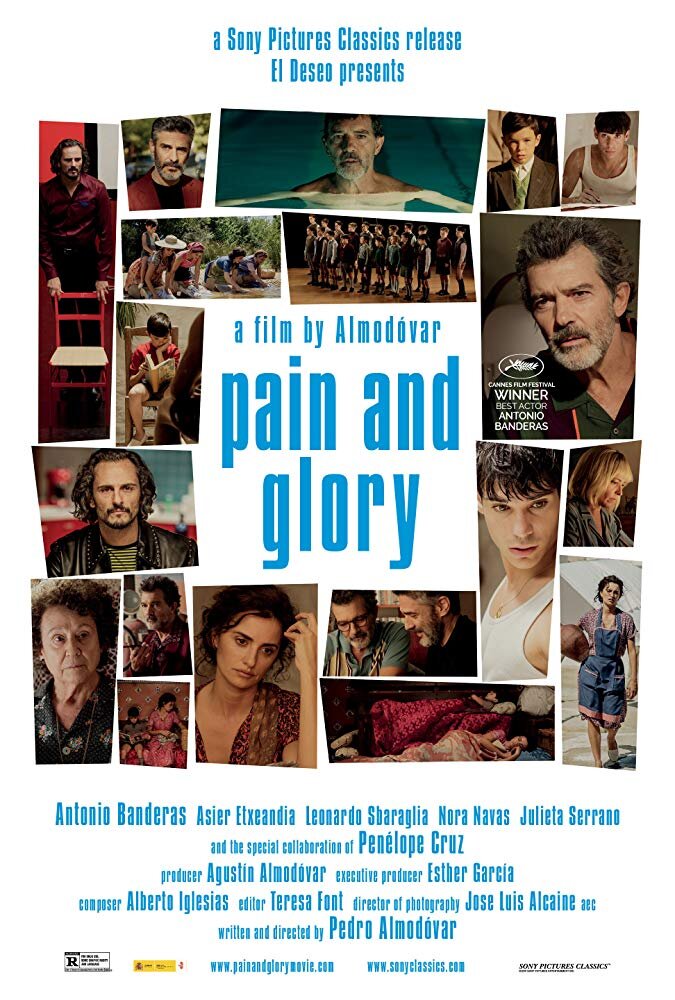Pain and Glory (2019)


SHOULD I SEE IT?
YES
Fans of Pedro Almodóvar will find plenty to love and celebrate, as the filmmaker digs into a deeply personal story of a filmmaker contemplating the twilight of his tumultous life and career.
Ranks at or near the top of the finest performances in Antonio Banderas’ long and storied career.
Dramatic, real, authentic, and creatively sobering, Almodóvar’s film is really a portrait on legacy and how one defines themselves vs. what they share out into the world.
NO
Some will miss the more melodramatic qualities of Pedro Almodóvar’s previous films and want Pain and Glory to be more bombastic than it is.
A film that lives in shades of grey, as people often do, and has characters we empathize with not always making their best choices. Some viewers may struggle with that.
Introspective movies sometimes feel distancing. Some may never connect with the emotions of the piece and, in turn, find Pain and Glory more of the former and less of the latter.
OUR REVIEW
A storied filmmaker reflects on his life, successes, failures, past loves, and present challenges in Pedro Almodóvar’s latest film. Featuring one of the finest performances of Antonio Banderas’ career, Pain and Glory is a moving and powerful elegy that one cannot help but think mirrors Almodóvar’s life in so many ways.
Deeply introspective, Banderas plays Salvador Mallo, an aging filmmaker who is riding a career resurgence with the re-release of one of his most beloved films. As he prepares to re-engage with that phase of his career, he reconnects with the film’s temperamental star, Alberto Crespo (Asier Etxeandia). Their reconnection leads Salvador to a number of troubling decisions, not the least of which involves the use of heavy drugs to mask various stages of pain, while also opening his mind to recall previous memories.
In flashback, we learn of Salvador’s relationship with his mother Jacinta (Penélope Cruz) while growing up with a largely absent father. His youthful self (Asier Flores) is curious, adventurous, and able to teach a handyman, Eduardo (César Vicente), how to read and write.
We move back and forth from present to recent and distant past. Acrimony exists between Salvador and Crespo, but both men are challenged by the notion of working together once again. A monologue plays a key role. A surprise encounter with a former lover (Leonardo Sbaraglia) leaves Salvador opining for what once was and what, sadly for him, may never be again.
There is an elegiac nature to Pain and Glory which makes the film sound perhaps morose and full of sadness. I suppose that is a fair acknowledgment, but there is also a vivacity to the movie that exists almost despite Almodóvar’s searching through his more difficult memories and emotions in telling Salvador’s story.

Banderas is tremendous, the best he has been in years, and absorbs into Salvador. The actor, who has headlined big hit movies, as well as experienced some high-profile box-office failures, and more than his share of straight-to-video dreck, seems to be bringing forth tangible emotions and experiences from his own career into the role, making it feel lived in and authentic.
Pain and Glory finds Banderas working with Almodóvar for an 8th time, and the two are magic together. Their mutual trust allows the film to develop emotional connections that elevate the film into something deeply insightful and meaningful.
Paced well and lacking some of Almodóvar’s trademark melodramatic flourishes, Pain and Glory is full of moments – moments made unforgettable by Banderas, the score by Alberto Iglesias, lush cinematography from frequent Almodóvar cinematographer, José Luis Alcaine, and a strong supporting performances by Cruz, and 9-year-old Flores, who conveys emotions and truths about his character that underscore the origins of how and why Salvador would become the man he would become.
While some may find it difficult to connect to the ghosts Almodóvar and Banderas are entertaining, Pain and Glory explores the way people process the regrets and gratitude they feel later in life and questions how our experiences lead us to this notion of legacy. For Salvador, he wonders about his potential self-destruction, about his capacity to continue growing and evolving, and whether he has been good enough, and true enough, to himself and his art. Has he done enough?
Almodóvar and Banderas seem to be wrestling with many of these same questions, but their trust with one another allows them to dig deeper than what’s on the page and makes their pursuit of defining their personal pain and glory even more meaningful.
CAST & CREW
Starring: Antonio Banderas, Asier Etxeandia, Leonardo Sbaraglia, Penélope Cruz, Asier Flores, Julieta Serrano, Nora Navas, César Vicente, Cecilia Roth, Pedro Casablanc, Rosalía.
Director: Pedro Almodóvar
Written by: Pedro Almodóvar
Release Date: October 4, 2019
Sony Pictures Classics
